Flood Sung
Kimi K2.5: Visual Agentic Intelligence
Feb 02, 2026Abstract:We introduce Kimi K2.5, an open-source multimodal agentic model designed to advance general agentic intelligence. K2.5 emphasizes the joint optimization of text and vision so that two modalities enhance each other. This includes a series of techniques such as joint text-vision pre-training, zero-vision SFT, and joint text-vision reinforcement learning. Building on this multimodal foundation, K2.5 introduces Agent Swarm, a self-directed parallel agent orchestration framework that dynamically decomposes complex tasks into heterogeneous sub-problems and executes them concurrently. Extensive evaluations show that Kimi K2.5 achieves state-of-the-art results across various domains including coding, vision, reasoning, and agentic tasks. Agent Swarm also reduces latency by up to $4.5\times$ over single-agent baselines. We release the post-trained Kimi K2.5 model checkpoint to facilitate future research and real-world applications of agentic intelligence.
OpenCUA: Open Foundations for Computer-Use Agents
Aug 12, 2025Abstract:Vision-language models have demonstrated impressive capabilities as computer-use agents (CUAs) capable of automating diverse computer tasks. As their commercial potential grows, critical details of the most capable CUA systems remain closed. As these agents will increasingly mediate digital interactions and execute consequential decisions on our behalf, the research community needs access to open CUA frameworks to study their capabilities, limitations, and risks. To bridge this gap, we propose OpenCUA, a comprehensive open-source framework for scaling CUA data and foundation models. Our framework consists of: (1) an annotation infrastructure that seamlessly captures human computer-use demonstrations; (2) AgentNet, the first large-scale computer-use task dataset spanning 3 operating systems and 200+ applications and websites; (3) a scalable pipeline that transforms demonstrations into state-action pairs with reflective long Chain-of-Thought reasoning that sustain robust performance gains as data scales. Our end-to-end agent models demonstrate strong performance across CUA benchmarks. In particular, OpenCUA-32B achieves an average success rate of 34.8% on OSWorld-Verified, establishing a new state-of-the-art (SOTA) among open-source models and surpassing OpenAI CUA (GPT-4o). Further analysis confirms that our approach generalizes well across domains and benefits significantly from increased test-time computation. We release our annotation tool, datasets, code, and models to build open foundations for further CUA research.
Kimi K2: Open Agentic Intelligence
Jul 28, 2025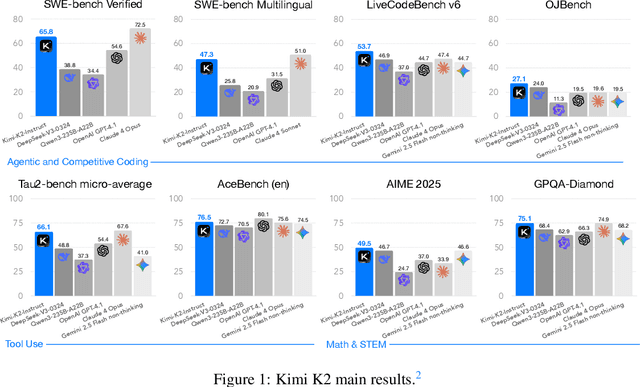


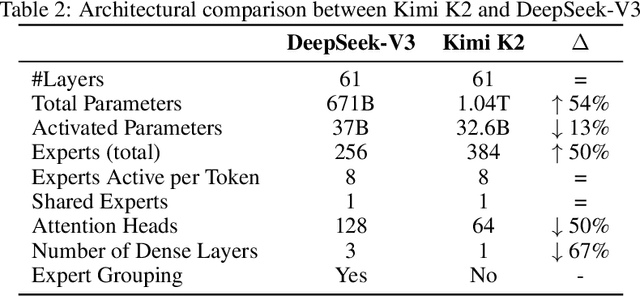
Abstract:We introduce Kimi K2, a Mixture-of-Experts (MoE) large language model with 32 billion activated parameters and 1 trillion total parameters. We propose the MuonClip optimizer, which improves upon Muon with a novel QK-clip technique to address training instability while enjoying the advanced token efficiency of Muon. Based on MuonClip, K2 was pre-trained on 15.5 trillion tokens with zero loss spike. During post-training, K2 undergoes a multi-stage post-training process, highlighted by a large-scale agentic data synthesis pipeline and a joint reinforcement learning (RL) stage, where the model improves its capabilities through interactions with real and synthetic environments. Kimi K2 achieves state-of-the-art performance among open-source non-thinking models, with strengths in agentic capabilities. Notably, K2 obtains 66.1 on Tau2-Bench, 76.5 on ACEBench (En), 65.8 on SWE-Bench Verified, and 47.3 on SWE-Bench Multilingual -- surpassing most open and closed-sourced baselines in non-thinking settings. It also exhibits strong capabilities in coding, mathematics, and reasoning tasks, with a score of 53.7 on LiveCodeBench v6, 49.5 on AIME 2025, 75.1 on GPQA-Diamond, and 27.1 on OJBench, all without extended thinking. These results position Kimi K2 as one of the most capable open-source large language models to date, particularly in software engineering and agentic tasks. We release our base and post-trained model checkpoints to facilitate future research and applications of agentic intelligence.
Divide-Fuse-Conquer: Eliciting "Aha Moments" in Multi-Scenario Games
May 22, 2025Abstract:Large language models (LLMs) have been observed to suddenly exhibit advanced reasoning abilities during reinforcement learning (RL), resembling an ``aha moment'' triggered by simple outcome-based rewards. While RL has proven effective in eliciting such breakthroughs in tasks involving mathematics, coding, and vision, it faces significant challenges in multi-scenario games. The diversity of game rules, interaction modes, and environmental complexities often leads to policies that perform well in one scenario but fail to generalize to others. Simply combining multiple scenarios during training introduces additional challenges, such as training instability and poor performance. To overcome these challenges, we propose Divide-Fuse-Conquer, a framework designed to enhance generalization in multi-scenario RL. This approach starts by heuristically grouping games based on characteristics such as rules and difficulties. Specialized models are then trained for each group to excel at games in the group is what we refer to as the divide step. Next, we fuse model parameters from different groups as a new model, and continue training it for multiple groups, until the scenarios in all groups are conquered. Experiments across 18 TextArena games show that Qwen2.5-32B-Align trained with the Divide-Fuse-Conquer strategy reaches a performance level comparable to Claude3.5, achieving 7 wins and 4 draws. We hope our approach can inspire future research on using reinforcement learning to improve the generalization of LLMs.
G1: Bootstrapping Perception and Reasoning Abilities of Vision-Language Model via Reinforcement Learning
May 19, 2025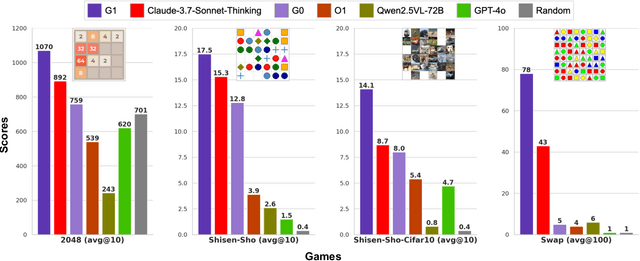


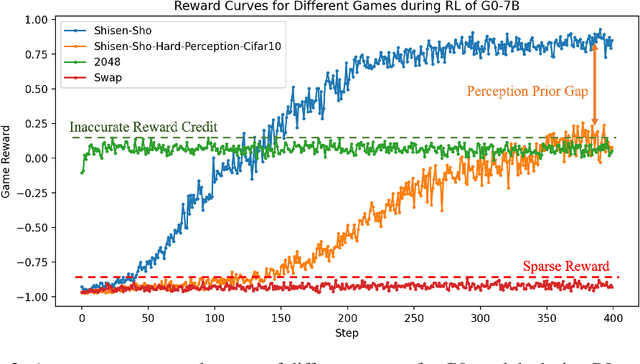
Abstract:Vision-Language Models (VLMs) excel in many direct multimodal tasks but struggle to translate this prowess into effective decision-making within interactive, visually rich environments like games. This ``knowing-doing'' gap significantly limits their potential as autonomous agents, as leading VLMs often performing badly in simple games. To address this, we introduce VLM-Gym, a curated reinforcement learning (RL) environment featuring diverse visual games with unified interfaces and adjustable, compositional difficulty, specifically designed for scalable multi-game parallel training. Leveraging VLM-Gym, we train G0 models using pure RL-driven self-evolution, which demonstrate emergent perception and reasoning patterns. To further mitigate challenges arising from game diversity, we develop G1 models. G1 incorporates a perception-enhanced cold start prior to RL fine-tuning. Our resulting G1 models consistently surpass their teacher across all games and outperform leading proprietary models like Claude-3.7-Sonnet-Thinking. Systematic analysis reveals an intriguing finding: perception and reasoning abilities mutually bootstrap each other throughout the RL training process. Source code including VLM-Gym and RL training are released at https://github.com/chenllliang/G1 to foster future research in advancing VLMs as capable interactive agents.
Learning to Plan Before Answering: Self-Teaching LLMs to Learn Abstract Plans for Problem Solving
Apr 28, 2025Abstract:In the field of large language model (LLM) post-training, the effectiveness of utilizing synthetic data generated by the LLM itself has been well-presented. However, a key question remains unaddressed: what essential information should such self-generated data encapsulate? Existing approaches only produce step-by-step problem solutions, and fail to capture the abstract meta-knowledge necessary for generalization across similar problems. Drawing insights from cognitive science, where humans employ high-level abstraction to simplify complex problems before delving into specifics, we introduce a novel self-training algorithm: LEarning to Plan before Answering (LEPA). LEPA trains the LLM to formulate anticipatory plans, which serve as abstract meta-knowledge for problem-solving, before engaging with the intricacies of problems. This approach not only outlines the solution generation path but also shields the LLM from the distraction of irrelevant details. During data generation, LEPA first crafts an anticipatory plan based on the problem, and then generates a solution that aligns with both the plan and the problem. LEPA refines the plan through self-reflection, aiming to acquire plans that are instrumental in yielding correct solutions. During model optimization, the LLM is trained to predict both the refined plans and the corresponding solutions. By efficiently extracting and utilizing the anticipatory plans, LEPA demonstrates remarkable superiority over conventional algorithms on various challenging natural language reasoning benchmarks.
Kimina-Prover Preview: Towards Large Formal Reasoning Models with Reinforcement Learning
Apr 15, 2025Abstract:We introduce Kimina-Prover Preview, a large language model that pioneers a novel reasoning-driven exploration paradigm for formal theorem proving, as showcased in this preview release. Trained with a large-scale reinforcement learning pipeline from Qwen2.5-72B, Kimina-Prover demonstrates strong performance in Lean 4 proof generation by employing a structured reasoning pattern we term \textit{formal reasoning pattern}. This approach allows the model to emulate human problem-solving strategies in Lean, iteratively generating and refining proof steps. Kimina-Prover sets a new state-of-the-art on the miniF2F benchmark, reaching 80.7% with pass@8192. Beyond improved benchmark performance, our work yields several key insights: (1) Kimina-Prover exhibits high sample efficiency, delivering strong results even with minimal sampling (pass@1) and scaling effectively with computational budget, stemming from its unique reasoning pattern and RL training; (2) we demonstrate clear performance scaling with model size, a trend previously unobserved for neural theorem provers in formal mathematics; (3) the learned reasoning style, distinct from traditional search algorithms, shows potential to bridge the gap between formal verification and informal mathematical intuition. We open source distilled versions with 1.5B and 7B parameters of Kimina-Prover
Kimi-VL Technical Report
Apr 10, 2025

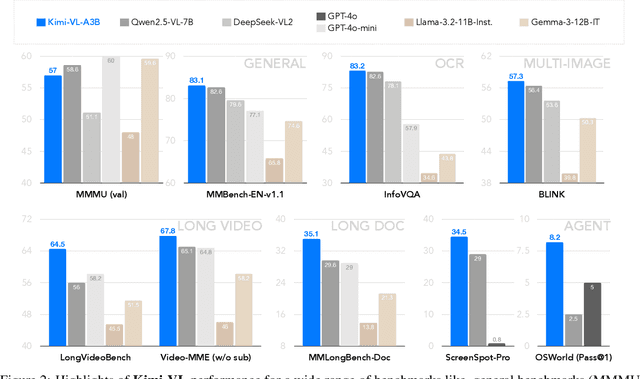

Abstract:We present Kimi-VL, an efficient open-source Mixture-of-Experts (MoE) vision-language model (VLM) that offers advanced multimodal reasoning, long-context understanding, and strong agent capabilities - all while activating only 2.8B parameters in its language decoder (Kimi-VL-A3B). Kimi-VL demonstrates strong performance across challenging domains: as a general-purpose VLM, Kimi-VL excels in multi-turn agent tasks (e.g., OSWorld), matching flagship models. Furthermore, it exhibits remarkable capabilities across diverse challenging vision language tasks, including college-level image and video comprehension, OCR, mathematical reasoning, and multi-image understanding. In comparative evaluations, it effectively competes with cutting-edge efficient VLMs such as GPT-4o-mini, Qwen2.5-VL-7B, and Gemma-3-12B-IT, while surpassing GPT-4o in several key domains. Kimi-VL also advances in processing long contexts and perceiving clearly. With a 128K extended context window, Kimi-VL can process diverse long inputs, achieving impressive scores of 64.5 on LongVideoBench and 35.1 on MMLongBench-Doc. Its native-resolution vision encoder, MoonViT, further allows it to see and understand ultra-high-resolution visual inputs, achieving 83.2 on InfoVQA and 34.5 on ScreenSpot-Pro, while maintaining lower computational cost for common tasks. Building upon Kimi-VL, we introduce an advanced long-thinking variant: Kimi-VL-Thinking. Developed through long chain-of-thought (CoT) supervised fine-tuning (SFT) and reinforcement learning (RL), this model exhibits strong long-horizon reasoning capabilities. It achieves scores of 61.7 on MMMU, 36.8 on MathVision, and 71.3 on MathVista while maintaining the compact 2.8B activated LLM parameters, setting a new standard for efficient multimodal thinking models. Code and models are publicly accessible at https://github.com/MoonshotAI/Kimi-VL.
More is not always better? Enhancing Many-Shot In-Context Learning with Differentiated and Reweighting Objectives
Jan 07, 2025



Abstract:Large language models (LLMs) excel at few-shot in-context learning (ICL) without requiring parameter updates. However, as the number of ICL demonstrations increases from a few to many, performance tends to plateau and eventually decline. We identify two primary causes for this trend: the suboptimal negative log-likelihood (NLL) optimization objective and the incremental data noise. To address these issues, we introduce DR-ICL, a novel optimization method that enhances model performance through Differentiated Learning and advantage-based Reweighting objectives. Globally, DR-ICL utilizes differentiated learning to optimize the NLL objective, ensuring that many-shot performance surpasses zero-shot levels. Locally, it dynamically adjusts the weighting of many-shot demonstrations by leveraging cumulative advantages inspired by reinforcement learning, thereby improving generalization. This approach allows the model to handle varying numbers of shots effectively, mitigating the impact of noisy data. Recognizing the lack of multi-task datasets with diverse many-shot distributions, we develop the Many-Shot ICL Benchmark (MICLB)-a large-scale benchmark covering shot numbers from 1 to 350 within sequences of up to 8,000 tokens-for fine-tuning purposes. MICLB facilitates the evaluation of many-shot ICL strategies across seven prominent NLP tasks and 50 distinct datasets. Experimental results demonstrate that LLMs enhanced with DR-ICL achieve significant improvements in many-shot setups across various tasks, including both in-domain and out-of-domain scenarios. We release the code and benchmark dataset hoping to facilitate further research in many-shot ICL.
Deep Comparison: Relation Columns for Few-Shot Learning
Nov 20, 2018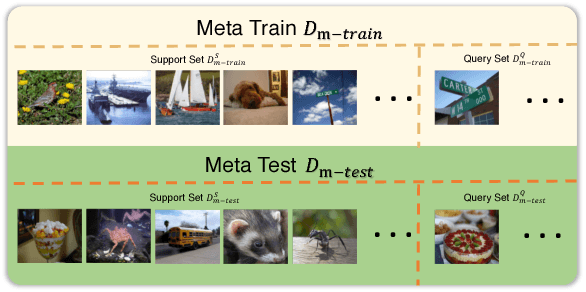
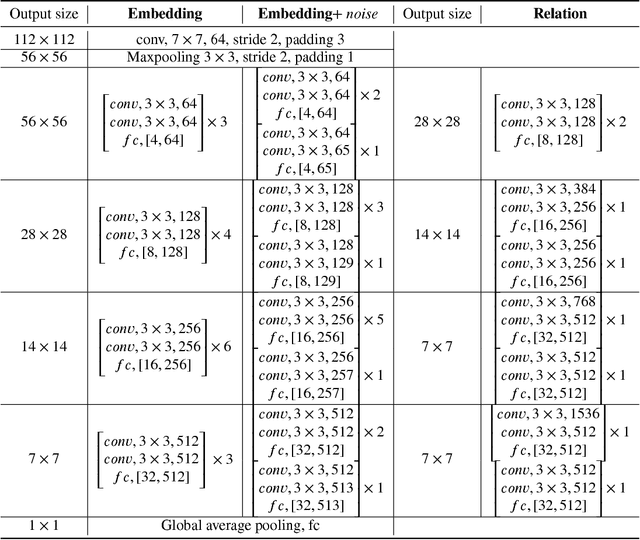
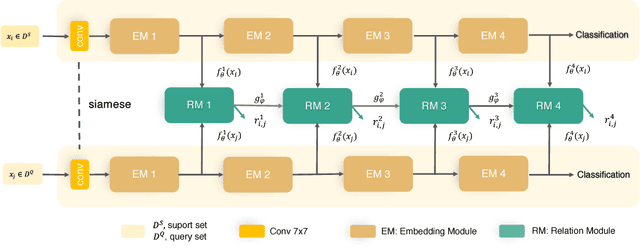
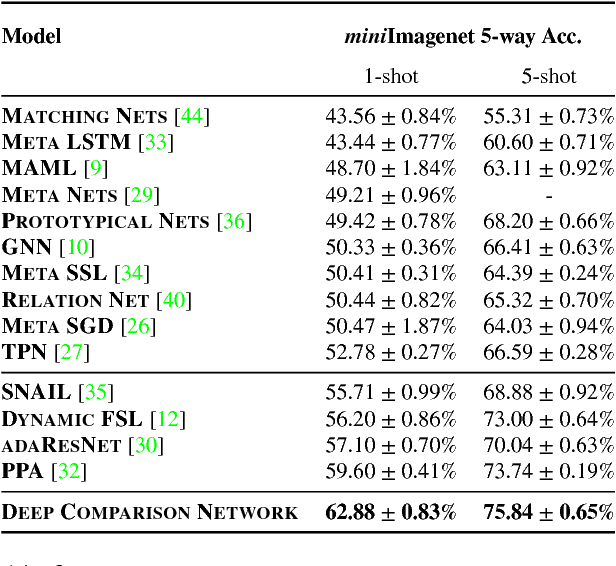
Abstract:Few-shot deep learning is a topical challenge area for scaling visual recognition to open-ended growth in the space of categories to recognise. A promising line work towards realising this vision is deep networks that learn to match queries with stored training images. However, methods in this paradigm usually train a deep embedding followed by a single linear classifier. Our insight is that effective general-purpose matching requires discrimination with regards to features at multiple abstraction levels. We therefore propose a new framework termed Deep Comparison Network(DCN) that decomposes embedding learning into a sequence of modules, and pairs each with a relation module. The relation modules compute a non-linear metric to score the match using the corresponding embedding module's representation. To ensure that all embedding module's features are used, the relation modules are deeply supervised. Finally generalisation is further improved by a learned noise regulariser. The resulting network achieves state of the art performance on both miniImageNet and tieredImageNet, while retaining the appealing simplicity and efficiency of deep metric learning approaches.
 Add to Chrome
Add to Chrome Add to Firefox
Add to Firefox Add to Edge
Add to Edge